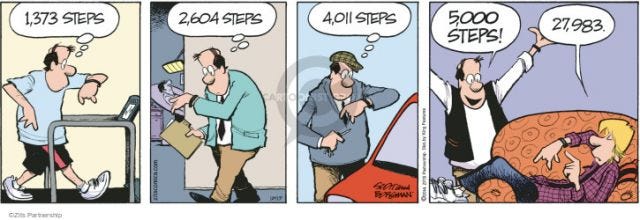So What, Who Cares (vol 2, issue 112) Who finally has some time again?
Hello! La rentrée was a tad hectic and this labor of love got lost amid the whirl.

The past month included reading a doorstopper of a Neal Stephenson book for one podcast (episode 277, coming up); watching some Muppets for another; defending the honor of Wonder Woman for a third podcast; talking Nerd Canon for a fourth podcast; being on a podcast about kids and technology for a fifth podcast (since I am now the "Generations" columnist for Macworld); ruining several movies for a sixth podcast; finding ways to make your Facebook feed more awesome; finding ways to bork my computer after installing the latest OS X upgrade; learning about how the notion of eyes-on-your-own-work is about to go away; test-driving Microsoft's new way of working collaboratively; eulogizing CSI on its series finale; and beginning coverage of The Affair with @philipmichaels, all while doing the day job and trying to be a decent human being to anyone I see face-to-face.Which brings me to my next point: both my Previously.TV and Macworld gigs are ongoing, the Flash flashcast resumes recording tomorrow, and I'm still gainfully employed.
So here's the haps:
1. I am looking for guest writers. Email me and tell me what news story you'd cover and why I should care about it.
2. I will likely be aiming to write this newsletter twice weekly for a while until I can get to a point where I can increase the frequency again and/or decide that you all need a daily newsletter in December because there are just so many bad made-for-TV holiday movies out there and we need to discuss them all.
*

The wearables market is sharing up to be one of the more interesting battlegrounds for money, because the big players are jockeying to pick up cash from the U.S.'s multibillion-dollar healthcare market. I can't stop thinking about how wearables are going to give healthcare providers an excuse to outsource more of the routine care to patients, and I'm now getting really curious about how long it will be before your company's making a wearable a condition of getting health insurance: Fitbit just earned its HIPAA compliance, which makes it a very attractive platform for insurance providers and HR execs who are looking for a way to gain more insight into employee habits as a way to see where the costs are coming from. Since FitBit is already running wellness programs with big companies like Geico, Quicken Loans and Target, the wearables company is positioned to move quickly in the lucrative corporate space.
So what? I don't know how many of you currently get insurance through an employer who charges smokers higher premiums than nonsmokers, but that's already a thing. Imagine the day when your insurance is tied to your daily activity level, and it's your FitBit data that determines your rates.
(Short answer: Get a dog.)
Who cares? Wearables types will care because the big question will be whether or not people will continue to wear a little band around their wrist or whether they'll throw over the device for the Apple watch, which is well-integrated into the rest of a user's tech ecosystem (i.e. mobile phone and computer). Grabbing the "preferred device of [Giant Insurance Company]" crown could buy a few more years' revenue. This is also good news for UnderArmour, as they own an Internet of Things platform that ties together fitness wearables with corporate loyalty programs. (More on UnderArmour's big play for big data in vol 2, issue 19.) They could make a lot of money if one of their customers is tapped for a company fitness program.
Frazzled workers -- who are already among the most time-crunched in the developed world -- are now

facing the possibility that they'll have to squeeze in physical activity every day or else their family finances will take a hit from higher insurance premiums. Then again, the day is coming when even white collar workers are going to be monitored every moment of their working day. Why wouldn't employer-bequeathed benefits be subject to the same transparency?
Extra reading: David Sedaris's "Living the Fitbit Life" explains how quickly the quest to hit 10,000 steps daily can lead one into madness.
*

Your pop culture notes of the day: I've gushed about Ted Chiang before (vol 2, issue 34) -- he's not a prolific writer but he is one the best short story writers working today -- and now you can hear the BBC turn his short story "Understand" into a serialized radio drama.
But I also wanted to recommend some delightfully spooky comics for you. Go look for a used copy of Dan Brereton's The Nocturnals: Dark Planet, because the painted panels -- done in a cool, rich, murky palette with gloriously retro lines -- are gorgeous and the story is pulpy in a very old-school Twilight Zone kind of way. There are a few more trades afterward (The Dark Forever and Unhallowed Eve) if you fall in love with this autumnal title.
*
It's October and it's time for a new footer, one where the hills are fog and the rivers are mist; where noons go quickly, dusks and twilights linger, and midnights stay. And so you can email me or tweet with feedback; you can share this newsletter and your friends can subscribe; or you can read through back issues.

